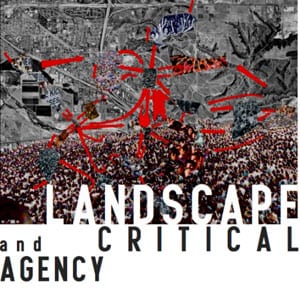Landscape and Critical Agency Symposium
By news editor, on 27 February 2012
 Written by Tim Waterman, Writtle School of Design.
Written by Tim Waterman, Writtle School of Design.
The ability to dominate and bend the planet to our creative or destructive will has guided our collective action in the landscape in recent centuries, but a richer idea of the landscape and our engagement with it may yet save us.
The Landscape and Critical Agency symposium at UCL on 17 February brought together 12 committed advocates for landscape in a one-day single-panel event designed to situate this discourse firmly within the range of disciplines concerned with the built environment.
The symposium posed the question:
“What agency does landscape possess, as a means of territorial organisation and creative production, to engage critically with the conditions that define the collective aspects of our environment?”
Bestowing agency upon the landscape itself is the first crucial step towards engaging in a conversation with it rather than perpetuating the obliterating human monologue to which we seem so tied.
Notably, the openness of engagement evident in this proposition was also reflected in the fact that four institutions came together to stage the event. The symposium was organised by Professor Murray Fraser of the UCL Bartlett, Douglas Spencer of the Architectural Association, Ed Wall of Kingston University and myself.
Speakers on the day included the aforementioned and a range of scholars primarily from North America and the UK – a fact which may indicate the current locus of this discourse.
The day was organised into three sessions of three presentations, followed by a plenary discussion. The three sessions addressed the overarching themes of ‘Contemporary Conditions’, ‘Collective Agents,’ and ‘Ecologies.’ Professor Jonathan Hill commenced the proceedings with a rich exploration of air and industry, landscape and architecture drawn largely from his new book, Weather Architecture.
Contemporary conditions
The first session addressed current intellectual and professional contexts in theory and practice. Douglas Spencer led with a galvanising paper containing a powerful critique of McHargian ‘Ecological Determinism’ and weaving through Stan Allen, DeLanda, Latour, and Adorno.
Jill Desimini (Harvard Graduate School of Design) examined shrinking cities and the concept of the commons through the lens of projects such as the Red Thread in Dessau, Germany and Local Code in San Francisco.
And Ed Wall spoke of failed promise through the lens of original (tweed-bound) renderings of the private Paternoster Square and, in high chiaroscuro, with images of the Occupy encampment and riot barriers.
Collective Agents
Professor Matthew Gandy presented a masterful analysis of Gilles Clément’s Derborence Island at the Parc Henri Matisse in Lille, France, where tensions between public space and ‘wild’ space are made poignantly evident.
Jane Wolff, head of landscape architecture at the University of Toronto, captivated the audience with a set of playing cards used for community consultation that brought together social, cultural, economic, and ecological concerns in a project called ‘Delta Primer’.
Then I presented my elaborations on the idea of ‘toposophy’, the “embodied wisdom of anthropological space”, making broad links between the spatial and corporeal turns in particular as reflected in the landscape idea.
Ecologies
In the final session, Jane Hutton (Harvard GSD) and Jon Goodbun (University of Westminster/RCA) presented two radically different, but complementary, approaches to ecology, with Hutton examining the sourcing of materials for landscape projects from global to local scales at either end of the supply chain and Goodbun tracing ecologies of the mind from the proto-ecological thinking found in Marx and Engels through to theories of cybernetics.
This immensely stimulating programme of events culminated with a panel and an animated discussion. Most exciting of all was the shared sense that a most urgent conversation was had, and that this symposium will point the way to many such events in the future.
 Close
Close

